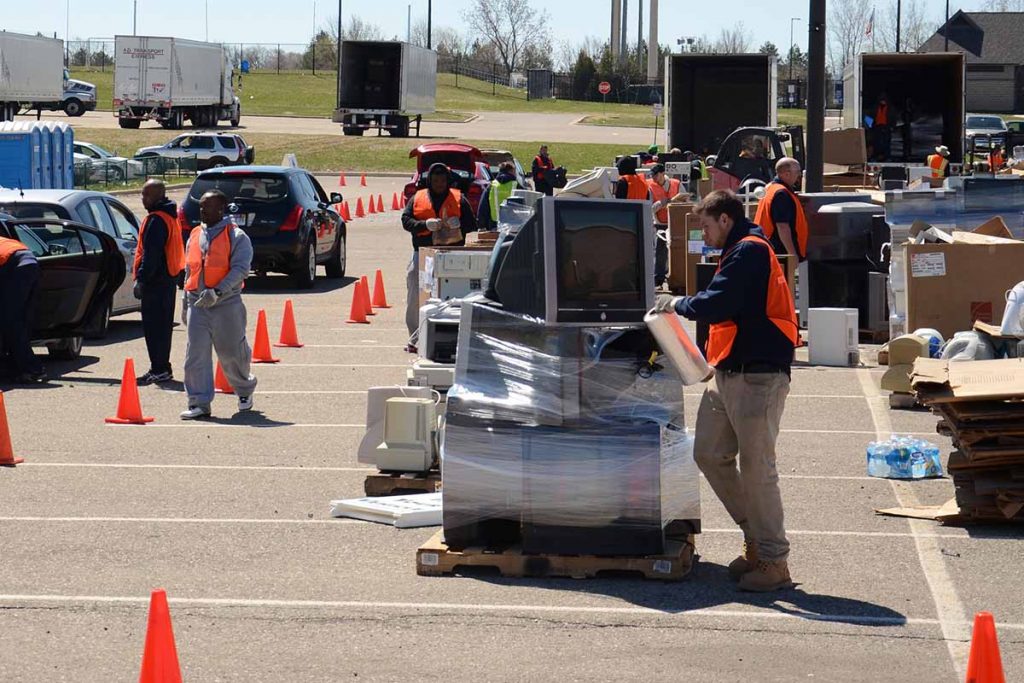
The Washington Department of Ecology asked over 100 governments to fill out a survey on e-scrap program effectiveness. | Susan Montgomery/Shutterstock
Washington state’s e-scrap program released a report outlining the sentiments of community officials when it comes to collection convenience and more. Meanwhile, Wisconsin’s E-Cycle program awarded a round of grant funding.
Here’s a roundup of state program news.
Local opinions in Washington
E-Cycle Washington’s 2021 Local Government and Community Satisfaction Report found that many local governments want better outreach and an expanded list of covered items.
The Washington Department of Ecology asked over 100 governments to fill out a survey on program effectiveness, and 31 responded.
Of that 31, 48% thought the collection services in their communities provided by the Washington Materials Management and Financing Authority, which runs the E-Cycle program, were accessible and convenient for the public. Another 29% said they were not, while 23% did not respond.
Commenting on the survey question, one respondent said, “As services reopen and reestablish, we think a well-planned and comprehensive relaunch of E-Cycle is warranted and should take a ‘build back better’ orientation. We don’t ever receive information on where collection sites are and have never seen any advertised.”
Another said the “website is not very easy to use and seems to only be provided in English.”
“The WMMFA should consider how to make their services more accessible for the diverse communities, including underserved communities,” the respondent said. “This could include providing collection services and sites closer to where people work and live; providing better access in terms of opening hours; and communicating in ways that are effective for the diverse communities.”
Several respondents asked E-Cycle to add additional materials to the covered list.
Another survey question aimed to find out how E-Cycle Washington has affected the community since it began in 2009. When asked if businesses were providing recycling who were not providing that service before E-Cycle Washington, 48% said yes, 16% no and 35% did not respond.
The second part of the question asked if people were recycling their electronics now when they may have thrown them in the trash before the E-Cycle program. In that case, 52% said yes, 6% no and 42% did not respond.
Several respondents said the questions were leading, with one writing that it’s “unlikely that either would ever be no. I believe there is a lot of e-waste going into the landfill now because the majority of the public does not know about E-Cycle Washington.”
Others said from visual and anecdotal evidence they think the program decreased illegal dumping of electronics and increased opportunities for responsible recycling.
However, several respondents pointed out the declining amounts of electronics the program has been collecting. Overall, E-Cycle Washington collected over 14.6 million pounds of electronics in 2021, down from 15.2 million pounds in 2020 and 21.4 million pounds in 2019.
“It is worrying that the amounts collected by E-Cycle WA are decreasing while greater amounts of covered products are being sent to landfill, both for us in King County and also at the state level, according to the most recent waste characterization studies,” one respondent wrote.
Wisconsin DNR awards grants
A new grant program created by Wisconsin’s legislature in 2021 has awarded more than $85,000 to 15 projects in 13 counties.
The E-Cycle Wisconsin Electronics Collection Grants are meant to improve access to electronics recycling in underserved areas of the state and prioritize projects in counties that do not have any permanent collection sites.
This round of grants will help fund three permanent electronics collection sites and up to 16 one-day collection events, a press release said. Money for the grants comes from fees electronics manufacturers pay under E-Cycle Wisconsin.
“Our goal is to make convenient, affordable electronics recycling opportunities available statewide,” Gov. Tony Evers said in the press release. “These grants will help rural communities that haven’t had the same access to electronics recycling programs as those in other parts of the state. Responsible electronics recycling prevents pollution, reduces greenhouse gas emissions and creates jobs right here in Wisconsin.”
Crawford County, Dynamic Lifecycle Innovations, Jefferson County Solid Waste, Marquette County, Norsec Computer Recyclers LLC, Village of Paddock Lake, Polk County Recycling, Richland County, Village of Ridgeway and Taylor County Solid Waste Department all received grants for collection events.
Pepin County got a grant to set up two permanent collection sites and Riverview Transfer, Inc. received funding for improvements to an existing permanent collection site.
Wisconsin’s electronics recycling law, which took effect in 2010 and includes a disposal ban for certain types of electronics. E-Cycle Wisconsin is a manufacturer-funded program administered by the Department of Natural Resources that has created a statewide network of electronics collectors and recyclers.
“We know E-Cycle Wisconsin has had some gaps in access. We’re excited to be able to use these grants to help fill those,” Sarah Murray, DNR E-Cycle Wisconsin coordinator, said in the press release. “We’re looking forward to seeing the results of this year’s projects and helping additional communities in the future.”
More stories about collection
- Sunnking reports 5% increase in recycling
- Wisconsin E-Cycle report reflects increasing access
- Policy round-up: Solar stewardship, state changes